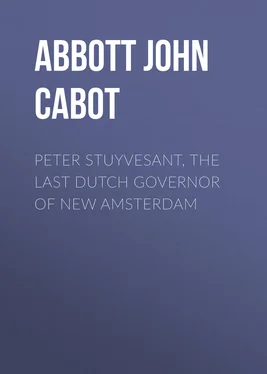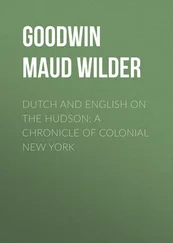John Abbott - Peter Stuyvesant, the Last Dutch Governor of New Amsterdam
Здесь есть возможность читать онлайн «John Abbott - Peter Stuyvesant, the Last Dutch Governor of New Amsterdam» — ознакомительный отрывок электронной книги совершенно бесплатно, а после прочтения отрывка купить полную версию. В некоторых случаях можно слушать аудио, скачать через торрент в формате fb2 и присутствует краткое содержание. Жанр: foreign_prose, История, foreign_edu, foreign_antique, на английском языке. Описание произведения, (предисловие) а так же отзывы посетителей доступны на портале библиотеки ЛибКат.
- Название:Peter Stuyvesant, the Last Dutch Governor of New Amsterdam
- Автор:
- Жанр:
- Год:неизвестен
- ISBN:нет данных
- Рейтинг книги:3 / 5. Голосов: 1
-
Избранное:Добавить в избранное
- Отзывы:
-
Ваша оценка:
- 60
- 1
- 2
- 3
- 4
- 5
Peter Stuyvesant, the Last Dutch Governor of New Amsterdam: краткое содержание, описание и аннотация
Предлагаем к чтению аннотацию, описание, краткое содержание или предисловие (зависит от того, что написал сам автор книги «Peter Stuyvesant, the Last Dutch Governor of New Amsterdam»). Если вы не нашли необходимую информацию о книге — напишите в комментариях, мы постараемся отыскать её.
Peter Stuyvesant, the Last Dutch Governor of New Amsterdam — читать онлайн ознакомительный отрывок
Ниже представлен текст книги, разбитый по страницам. Система сохранения места последней прочитанной страницы, позволяет с удобством читать онлайн бесплатно книгу «Peter Stuyvesant, the Last Dutch Governor of New Amsterdam», без необходимости каждый раз заново искать на чём Вы остановились. Поставьте закладку, и сможете в любой момент перейти на страницу, на которой закончили чтение.
Интервал:
Закладка:
In their traffic the Dutch at first exchanged for furs only articles of ornament or of domestic value. But the bullet was a far more potent weapon in the chase and in the hunting-field than the arrow. The Indians very soon perceived the vast advantage they would derive in their pursuit of game, from the musket, as well as the superiority it would give them over all their foes. They consequently became very eager to obtain muskets, powder and ball. They were warm friends of the Europeans. There seemed to be no probability of their becoming enemies. Muskets and steel traps enabled them to obtain many more furs. Thus the Indians were soon furnished with an abundant supply of fire-arms, and became unerring marksmen.
Year after year the returns from the trading-posts became more valuable; and the explorations were pushed farther and farther into the interior. The canoes of the traders penetrated the wide realms watered by the upper channels of the Delaware. A trading-house was also erected in the vast forest, upon the Jersey shore of the Hudson River, where the thronged streets of Jersey City at the present hour cover the soil.
We have now reached the year 1618, two years before the arrival of the Pilgrims at Plymouth. Though the energetic Dutch merchants were thus perseveringly and humanely pushing their commerce, and extending their trading posts, no attempt had yet been made for any systematic agricultural colonization.
The Dutch alone had then any accurate knowledge of the Hudson River, or of the coasts of Connecticut, Rhode Island, and Long Island. In 1618 the special charter of the Company, conferring upon them the monopoly of exclusive trade with the Indians, expired. Though the trade was thus thrown open to any adventurous Dutch merchant, still the members of the Company enjoyed an immense advantage in having all the channels perfectly understood by them, and in being in possession of such important posts.
English fishing vessels visited the coast of Maine, and an unsuccessful attempt had been made to establish a colony at the mouth of the Kennebec River. Sir Walter Raleigh had also made a very vigorous but unavailing effort to establish a colony in Virginia. Before the year 1600, every vestige of his attempt had disappeared. Mr. John Romeyn Brodhead, in his valuable history of the State of New York, speaking of this illustrious man, says:
"The colonists, whom Raleigh sent to the island of Roanoke in 1585, under Grenville and Lane, returned the next year dispirited to England. A second expedition, dispatched in 1587, under John White, to found the borough of Raleigh, in Virginia, stopped short of the unexplored Chesapeake, whither it was bound, and once more occupied Roanoke. In 1590 the unfortunate emigrants had wholly disappeared; and with their extinction all immediate attempts to establish an English colony in Virginia were abandoned. Its name alone survived.
"After impoverishing himself in unsuccessful efforts to add an effective American plantation to his native kingdom, Raleigh, the magnanimous patriot, was consigned, under an unjust judgment, to lingering imprisonment in the Tower of London, to be followed, after the lapse of fifteen years, by a still more iniquitous execution. Yet returning justice has fully vindicated Raleigh's fame. And nearly two centuries after his death the State of North Carolina gratefully named its capital after that extraordinary man, who united in himself as many kinds of glory as were ever combined in any individual."
CHAPTER III.
THE COMMENCEMENT OF COLONISATION
The Puritans.—Memorial to the States-General.—Disagreement of the English and the Dutch.—Colony on the Delaware.—Purchase of Manhattan.—The First Settlement.—An Indian Robbed and Murdered.—Description of the Island.—Diplomatic Intercourse.—Testimony of De Rassieres.—The Patroons.—The Disaster at Swaanendael.
In the year 1620 the Puritans founded their world-renowned colony at Plymouth, as we have minutely described in the History of Miles Standish. It will be remembered that the original company of Puritans were of English birth. Dissatisfied with the ritual and ceremonies which the Church of England had endeavored to impose upon them, they had emigrated to Holland, where they had formed a church upon their own model. Rev. John Robinson, a man of fervent piety and of enlightened views above his times, was their pastor.
After residing in Holland for several years, this little band of Englishmen, not pleased with that country as their permanent abode, decided to seek a new home upon the continent of North America. They first directed their attention towards Virginia, but various obstacles were thrown in their way by the British Government, and at length Mr. Robinson addressed a letter to the Dutch Company, intimating the disposition felt by certain members of his flock, to take up their residence at New Netherland.
The proposition was very cordially received. The intelligent gentlemen of that Company at once saw that there was thus presented to them an opportunity to establish a colony, at their trading post, which it would be wise to embrace. They therefore addressed a memorial upon the subject to the States-General, and to the Prince of Orange, in which they urged the importance of accepting the proposition which they had received from Mr. Robinson, and of thus commencing an agricultural colony upon the island of Manhattan. In this memorial they write under date of February, 1620:
"It now happens that there resides at Leyden an English clergyman, well versed in the Dutch language, who is favorably inclined to go and dwell there. Your petitioners are assured that he knows more than four hundred families, who, provided they were defended and secured there by your Royal Highness, and that of the High and Mighty Lords States-General, from all violence on the part of other potentates, would depart thither, with him, from this country and from England, to plant, forthwith, everywhere the true and pure Christian religion; to instruct the Indians of those countries in the true doctrine; to bring them to the Christian belief; and likewise, through the grace of the Lord, and for the greater honor of the rulers of this land to people all that region under a new dispensation; all under the order and command of your princely Highness and of the High and Mighty Lords States-General.
"Your petitioners have also learned that His Britannic Majesty is inclined to people the aforesaid lands with Englishmen; to destroy your petitioners' possessions and discoveries, and also to deprive this State of its right to these lands, while the ships belonging to this country, which are there during the whole of the present year, will apparently and probably be surprised by the English."
The petitioners therefore prayed that the request of Mr. Robinson might be favorably regarded; that the contemplated colony should be taken under the protection of the Dutch government, and that two ships of war should be sent out for the defence of the infant settlements.
The Dutch government was then upon the eve of a war with Spain, and all its energies were demanded in preparation for the conflict. They therefore quite peremptorily refused to entertain the petition of the New Netherland Company. Thus the destination of the Puritans was changed. Though they were not encouraged to commence their colonial life at New Netherland, still it was their intention when they sailed from England, to find a home somewhere in that vicinity, as England, as well as Holland, claimed the whole coast. A note, in the History of New Netherland, by E.B. O'Callaghan, contains the following interesting statement upon this subject:
"Some historians represent that the Pilgrims were taken against their will to New Plymouth, by the treachery of the captain of the Mayflower, who, they assert, was bribed by the Dutch to land them at a distance from the Hudson river. This has been shown, over and over again, to have been a calumny; and, if any farther evidence were requisite, it is now furnished, of a most conclusive nature, by the petition in behalf of the Rev. Mr. Robinson's congregation, of Feb. 1620, and the rejection of its prayer by their High Mightinesses.
Читать дальшеИнтервал:
Закладка:
Похожие книги на «Peter Stuyvesant, the Last Dutch Governor of New Amsterdam»
Представляем Вашему вниманию похожие книги на «Peter Stuyvesant, the Last Dutch Governor of New Amsterdam» списком для выбора. Мы отобрали схожую по названию и смыслу литературу в надежде предоставить читателям больше вариантов отыскать новые, интересные, ещё непрочитанные произведения.
Обсуждение, отзывы о книге «Peter Stuyvesant, the Last Dutch Governor of New Amsterdam» и просто собственные мнения читателей. Оставьте ваши комментарии, напишите, что Вы думаете о произведении, его смысле или главных героях. Укажите что конкретно понравилось, а что нет, и почему Вы так считаете.












